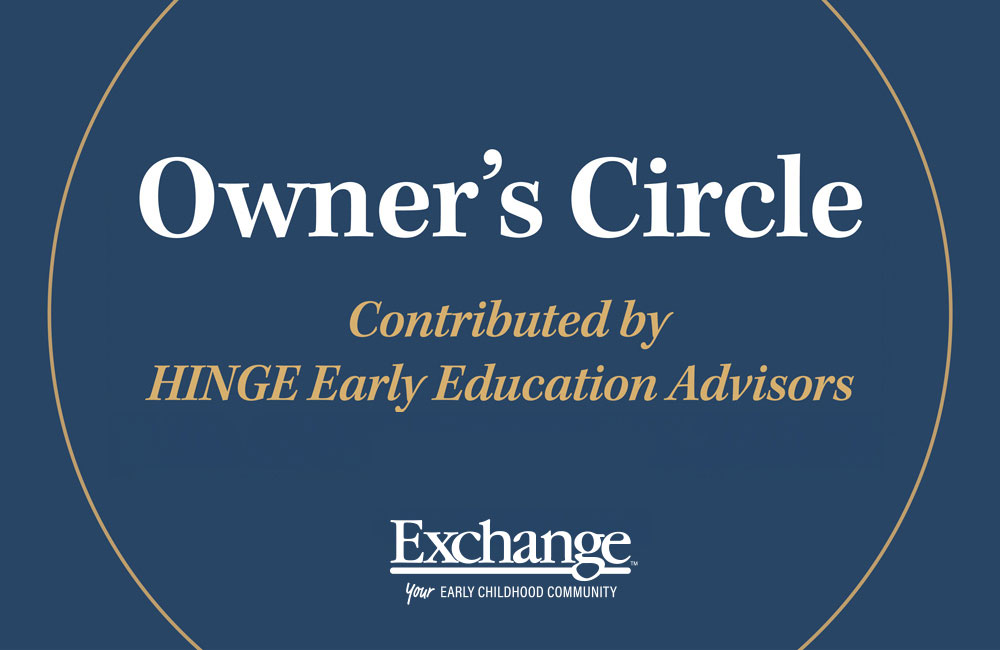Vision – Check
Values – Check
Policies – Check
Procedures – Check
Pedagogy – Check
Well then—this should be smooth sailing at our multi-site non-profit child care organization, right?
Well yes … and also no.
Through our rapid growth from a community-founded child care center to a multi-site, 13 program, 70-educator organization, we did our best to keep up with all the changes. Designing and developing facilities, keeping enrollment full, adapting to changing government funding, and licensing requirements. We were busy and we built policies and procedures mostly around situations as we encountered them.
Too many sick children—here’s a health policy
Too many late pick ups—here is a late pick up policy
At some point (a few years in) we were able to catch our breath and lift our heads. Around that time, our leadership encountered a powerful professional learning event that starkly illuminated the inadequacy and fragility of policies and procedures without vision and values.
We had built without a foundation—no wonder things felt shaky!
What ensued was a reverse engineering of our organization—we rebuilt the foundation with a collaborative and in-depth process to articulate our vision and values. We endlessly word-smithed the document until we had it as brief, clear, and honest as we could. We wrestled with how to be authentic and aspirational as well as accessible and accountable.
Once we anchored ourselves to both our vision and values, we were steady enough to take a fresh look at our policies and procedures and begin to align them to ensure that what we said was also what we did. Not only did we rewrite many policies and procedures we also identified gaps and omissions and looked at how we could address those in a way that lived into our vision and values.
We then turned our attention to our pedagogy—our work. We had learned from many colleagues, been to many professional learning experiences and we wrote our own handbook for our work—we called it “Evidence of Thoughtful Practice” and it guides our work. We creatively massaged the budget to afford two full time Pedagogical Leaders who support our educators as they develop in their understanding of our work. We firmly and unapologetically centered pedagogy in our organization—it is the heartbeat, the priority, and the flag that flies over everything.
And then, yes, we felt like we had it all.
Until we realized something else …
How I live into a value and how you live into a value may not be the same? While we really embraced the differences between our multiple sites, honouring the educators, children, and families that made each site unique, we also were looking to ensure the same standards of care existed across all sites. Our practice needed to be consistently at the same standard for all our children and families.
And so, our Standards of Practice (SoP’s) were initiated. And I hasten to say, not as a tool for compliance or uniformity, but as a way to honour our pedagogy. To offer to all our families and educators a framework that was similar and predictable site to site.
ADVERTISEMENT
We started with circle time. We gathered the whole organization to have a conversation on this moment that happens a couple of times a day in our full day child care programs.
Was it even a circle? What was happening at that time? What did best practice look like for each age group for these kinds of gatherings? What was happening during these times for children, for educators?
To say the discussion was feisty and robust is a fair reflection of the passion and tone of the conversation. We listened to each other, heard different ideas and perspectives, and sought consensus on what the essential elements of this time of our days together would be.
It wasn’t an easy process and not everyone was happy at the end of it but we did arrive at a place that we could all live in to and up to—starting with abandoning circle time as a moniker and moving our collective language to group time. Our SoP on group time includes how it will be and also how it will not be. It ensures the experience of educators and children site to site will have some clear similarities and we can be held to these agreements we created together.
And then we moved on to other areas that needed a SoP and we have spent this year on art practices alongside an art educator who we brought on to guide us and build our art understanding and skills. Upcoming topics coming to our SoP protocol are outdoor play, celebrations, and nap time.
We are slowly also developing a protocol for these within our organization. We foreground the topic with an experience for our educators. For our outdoor play SoP, the day will start with each team being assigned an outdoor space in our city to explore and consider from a pedagogical perspective. Then they will return to their sites and have a facilitated dialogue over articles, media and research on outdoor play. They will be invited to edit the draft SoP making deletions or additions and then one educator from each team will form a working group to look at all the feedback from all sites and the working group will present a final draft within three months.
Every SoP is linked to one or more of our values. SoP’s are brief, clear, actionable, and formatted on the same template for consistency.
In this way, the evolution of our organization has also been everyone’s professional learning. We have matured and deepened our thinking as early learning professionals just as the organization has matured and deepened. And we and it are reflections of each other—we hold a mirror up to one another to ensure we are who we say we are and that we are doing what we say we do.
This journey of ours may seem circuitous and yet in many ways allowing space to continue to think and re-think about our practice enlivens our days. Our reflective practice keeps us current and focuses us on forward-thinking and action as we seek to be a community in a constant state of learning; educators, children, and families.
Ann Pelo in “From Teaching to Thinking” summarizes it for us like this, “Professional learning as pedagogical practice is on-going and every day. When we shape professional learning as pedagogical practice, we commit to the long haul and take the long view of time. We calibrate professional learning to the scale of years rather than weeks or months. Our aim is to grow into a community that learns, to shape a culture of inquiry; this takes spacious time and is far from efficient—but it is also soul-nourishing and deeply sustaining for intellect and heart.”
We remain curious about what comes next for us and we hope you are curious about what comes next for you. Let us continue to build our field into a professional community of learners and doers in service of the children and families in our communities.
References
Pelo, A. & Carter, M. (2019) From Teaching to Thinking. Exchange Press.
Nicky Byres has served as the executive director of the Society of Richmond Children's Centres for 20 years, leading 60 educators in six centres. She is also an ECE instructor, child care advocate and community of practice consultant.
Related
ADVERTISEMENT












